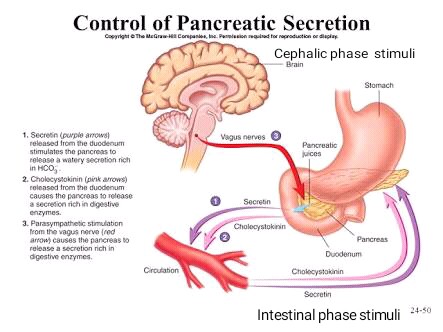Question #30249
1 Answer
Hormone i.e
Explanation:
Just like many the other processes, digestion is also controlled by brain, nervous system and hormone.
-
Even when we haven't started eating, our brain starts telling our digestive organs i.e pancreas and stomach via nerves about the expected entry of food. And pancreas stimulated by neural signals produce about
#20%# of it's total secretion. Thus, neural inputs contribute to small amount of pancreatic secretion. This is an example of Cephalic stimuli that results from sight, smell, though of food etc... -
When the food enters small intestine then secretion of pancreatic juice is mainly triggered by hormones produced by small intestine. Thus majority of pancreatic secretion arise from intestine phase stimuli. One of them is Secretin. This hormone is secreted by "
#"S cells"# " of intestinal mucosa an entry of acidic chyme into duodenum. Secretin stimulate duct cells to secrete bicarbonate ions#(HCO^(3-))# .
Another major hormone is cholecystokinin#("CCK")# . This hormone is secreted by "#"I cells"# " of intestinal mucosa.#"CCK"# stimulate acinar cells to secrete a lot of digestive enzymes.
Both of these hormones are carried by the blood to pancreas. Thus, pancreas is stimulated to produce pancreatic juice.

Hope it helps...

